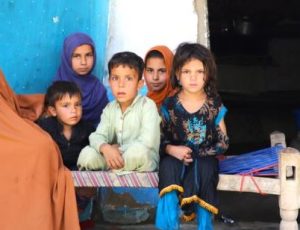Afghan refugees being expelled from Pakistan
Pakistan has ordered more than 1.7 million unauthorised Afghan asylum seekers to leave the country by November.
The move comes in the wake of escalating tensions along the Pakistan-Afghanistan border, which Islamabad attributes to Afghanistan-based militia groups.
And it comes after a devastating earthquake killed at least 2000 people and flattened villages and homes near the Afghan province of Herat.
The situation has sparked a crackdown on what Pakistan terms “illegal” migrants, sparking international concern and a plea from the Taliban government in Afghanistan.
The NGO Amnesty International has called on Pakistan to reverse the decision.
“Afghans in Pakistan are fleeing persecution by the Taliban. They are living incredibly precarious lives where they are either having to undergo arduous processes for registering as refugees in Pakistan; or are stuck in lengthy processes waiting to obtain relocation to another country. A forced return to Afghanistan could put them at grave risk,” said Amnesty spokesperson Nadia Rahman.
For decades, Pakistan has played host to Afghan refugees fleeing conflict and instability in their homeland. The right to seek refuge in a foreign country is protected by international law, and Pakistan has accommodated hundreds of thousands of Afghan refugees, especially after the Taliban’s return to power in Afghanistan in 2021.
According to the United Nations, approximately 1.3 million Afghans are registered as refugees, with an additional 880,000 enjoying legal status within Pakistan.
The Taliban government has urged Pakistan to rethink its “unacceptable” move.
Afghanistan’s rulers have repeatedly denied providing refuge for militants who target Pakistan.
Pakistan’s Interior Minister Sarfraz Bugti said the Afghans would have to leave the country by the end of November – whether voluntarily or through a forced deportation.
“If they do not go… then all the law enforcement agencies in the provinces or federal government will be utilised to deport them,” he said.
Reports say the Pakistan government is organising a taskforce aimed at identifying and confiscating private businesses and assets of “illegal” Afghans in the country.
But Taliban spokesman Zabihullah Mujahid said Afghan refugees are “not involved in Pakistan’s security problems”.
Reports say that local authorities have already begun rounding up Afghans – both those with and without legal status to remain.
One report said more than a thousand Afghans had been detained in the past two weeks.
Observers say that that Pakistan ultimately aims to expel all Afghans from the country, including those with legal status and residence cards.
Amnesty International has previously documented harassment inflicted on Afghan refugees in Pakistan.
And the UNHCR has issued a non-return advisory for Afghans outside of their home country following the Taliban takeover.
 According to the UN refugee agency UNHCR, there are more than 3.7 million Afghans in Pakistan, who fled Afghanistan for both economic and political reasons. Only 1.4 million of them are formally registered.
According to the UN refugee agency UNHCR, there are more than 3.7 million Afghans in Pakistan, who fled Afghanistan for both economic and political reasons. Only 1.4 million of them are formally registered.
Local Afghan communities in Australia, particularly minority communities, are concerned about the expulsions.
Many have relatives living in Pakistan who have been there decades.
“We are worried about our families if they have to go back to Afghanistan,” said Hazara community member Namitullah Amini.
“In Afghanistan they may end up destitute and they will be targeted by the Taliban,” he said.
“Life under the Taliban would be very difficult for many people.”












